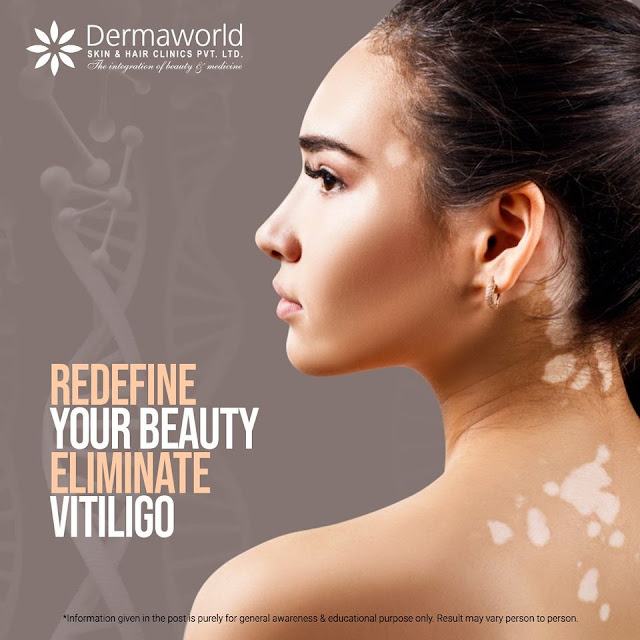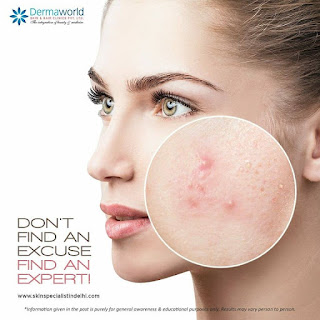5 Things to Know About Vitiligo
Are you facing a patchy loss of skin color in different body parts?
Vitiligo (Leukoderma) is the skin condition wherein the melanocytes (skin cells that produce melanin pigment) undergo destruction or weakening, leading to the appearance of white or patchy spots on the skin surface. It is found from research that the reason behind skin discoloration is an autoimmune disease (the immune system mistakenly acts against its skin cells), but sometimes stress, alcohol abuse, pollution, change in climate, and contact with a skin irritant can also trigger vitiligo. Vitiligo can affect any part of the skin and sometimes the whole body, including mucous membranes, eyes, and hair-bearing areas like the scalp.
Types of vitiligo:
Segmental or focal vitiligo occurs on one side of the body, and in this condition, the patches tend to appear smaller, and they generally spread across a limited area. Non-segmental vitiligo can affect any part of the body and is not limited to one particular side of the body, and these patches appear more symmetrical.
To understand better about this skin condition, the following are the five key points that helps one to know more about vitiligo:
It is a non-transmissible skin disease- Vitiligo is a non-communicable disease, which means vitiligo cannot be spread to others by direct or indirect contact such as touch, blood, saliva, inhalation, se-xual intercourse, or by use of personal items of the patient.
It is painless, and a neutral skin disorder- The person who suffers from this skin disease does not have any physical pain. But they do feel distressed due to change in skin color, hair color, and sometimes pupils of the eyes. The associated stress and lower self-esteem need to be made better by treating vitiligo.
The neutrality of vitiligo refers to the possibility of the appearance of this skin disorder in every individual irrespective of color, sex, age, or race. The most affected ones are the immunocompromised individuals. Family history may or may not be the reason for the occurrence of vitiligo in children.
It has no relation with food intake- It is a wrong belief of people who state that vitiligo is caused or spread due to milk consumption immediately after eating salty food or fish, white food items, or citrus fruit such as limes, lemons, and oranges. Hence, people suffering from vitiligo have no restrictions for food intake unless a doctor gives advice.
All white patches are not vitiligo- Vitiligo is an autoimmune disorder caused because of the loss of melanin pigment. Other skin conditions that lead to white patches or skin discoloration are leprosy, fungal skin infections, post-burnt skin, skin cancer, and albinism, are not to be understood as vitiligo, as these problems are associated with physical impairment which is not so in the case of vitiligo. Hence, it is important to consult a dermatologist to find the causative agent causing skin to lose its color.
Vitiligo is not life-threatening- It is a cosmetic issue and is not a dangerous health condition. A dermatologist can help restore the skin color and give relief from associated stress.
Treatment for vitiligo
Treatments for vitiligo are provided at Dermaworld Skin Clinic by a vitiligo specialist in Delhi, Dr. Rohit Batra. These treatments aim at calming the skin inflammation by controlling the overactive white blood cells that cause the destruction of the melanocyte. Topical steroids, cal-ci-neurin inhibitors, and phototherapy are very much effective in managing vitiligo. Depigmentation treatment is also available at Dermaworld Skin Clinic, in which the non-affected skin area is bleached with topical agents. The drastic results can be observed after surgery in which the melanocytes are grafted into the affected skin areas.
Treatment like psoralen and ultraviolet A (PUVA) therapy, Narrowband UV light, excimer laser treatment, and melanocyte transplants are performed at Dermaworld Skin Clinic.
Vitiligo is caused due to destruction of the pigment-producing cells melanocytes. These melanocytes produce melanin and help to protect the skin from UV rays damage. Thus extra precautions must be taken by vitiligo patients due to the inherent lack of sun protection. They must practice sun safety by wearing sun-protective clothing, glasses, and high SPF sunscreen that helps to prevent skin cancer.
Want to get treatment for vitiligo? Meet the best skin specialist in Delhi, Dr. Rohit Batra, at DermaWorld Skin Clinic to cure this skin problem.




Comments
Post a Comment